We may not have the course you’re looking for. If you enquire or give us a call on + 1-866 272 8822 and speak to our training experts, we may still be able to help with your training requirements.
Training Outcomes Within Your Budget!
We ensure quality, budget-alignment, and timely delivery by our expert instructors.
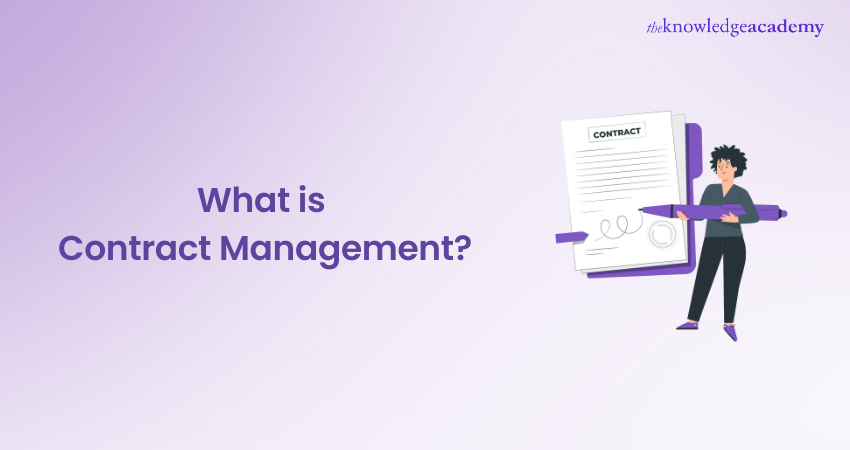
Is keeping your business agreements organised and compliant feeling like an uphill battle? Understanding Contract Management can transform how you handle agreements, ensuring every detail is meticulously managed. Imagine having a streamlined process that not only optimises your contracts but also boosts your organisation's efficiency and success.
By mastering this skill, you can achieve overarching organisational excellence. This blog will help you gain deeper insight into What is Contract Management. So read on and learn how efficient handling of agreements can propel your operations to extraordinary heights!
Table of Contents
1) What is Contract Management?
2) Stages of Contract Management
3) Benefits of Contract Management
4) What is Contract Management Software?
5) Contract Management Vs Contract Lifecycle Management
6) What are Contract Management Best Practices?
7) What are the Essential Skills Required for a Contract Manager?
8) What Responsibilities Does a Contract Manager Have?
9) Is Being a Contract Manager a High-pressure Job?
10) Signs of Successful Contract Management
11) Conclusion
What is Contract Management?
Contract Management is the process of overseeing the various stages of a contract, from creation to execution, and ultimately to termination or renewal. It involves ensuring that all parties involved in the contract fulfil their responsibilities and that the contract is carried out effectively.
The goal of Contract Management is to maximise the benefits of a contract while minimising the costs and risks involved.
Key Aspects of Effective Contract Management:
1) Accurate Record-Keeping:
a) Maintain up-to-date records of all contract-related activities.
b) Ensure documentation is easily accessible and organised.
2) Clear Communication:
a) Regularly communicate any changes or updates to stakeholders.
b) Foster open lines of communication to address issues promptly.
3) Risk Mitigation:
a) Identify potential risks early and develop strategies to mitigate them.
b) Monitor compliance with contract terms to avoid breaches.
4) Performance Monitoring:
a) Track the performance of all parties to ensure contract terms are met.
b) Use performance metrics to evaluate the effectiveness of the contract.
5) Cost Management:
a) Monitor and control costs associated with the contract.
b) Aim to reduce unnecessary expenses and optimise resource allocation.
6) Renewal and Termination:
a) Plan for contract renewal or termination well in advance.
b) Evaluate the outcomes of the contract to inform future agreements
How Does Contract Management Work?
Contract Management can be divided into two key stages:
a) Pre-award Stage: This refers to any work that takes place before a contract is signed. In this stage, it’s essential to ask yourself:
a) Why is the contract being established?
b) Will the supplier be able to deliver?
c) How will the contract function once it’s been awarded.
b) Post-award Stage: This is where Contract Management and maintenance come in and is divided into three stages:
a) Service Delivery: Ensuring service is delivered with the agreed quality levels.
b) Supplier Relationship: Maintaining an open and constructive relationship.
c) Contract Administration: Formal management of the contract.
Why is Contract Management Important?
Every company uses contracts to ensure each party knows what is expected of them in the commercial relationship. But agreeing and signing a contract isn't the end of it. Contract Management is crucial because it reduces the business's legal and financial risk.
When completed, it will identify errors or hazardous provisions and ensure everything follows corporate and regional laws.
By regularly managing their contracts, businesses can improve inefficient processes and they can avoid costly mistakes by analysing:
a) The progress of a contract.
b) Who it’s assigned to.
c) Any essential contractual dates.
Stages of Contract Management
We can break down the Contract Management Process into five key stages. They are:
1) Preparation: This stage involves identifying the need for a contract and drafting relevant documents supporting it. Both parties must meet to confirm the objectives and expectations and decide what to include in the contract terms.
2) Draft and Negotiation: Once both parties have discussed their expectations, the Contract Manager can move on with the initial drafting of the contract. Then, the parties can review it to ensure it encompasses their expectations and addresses the risks.
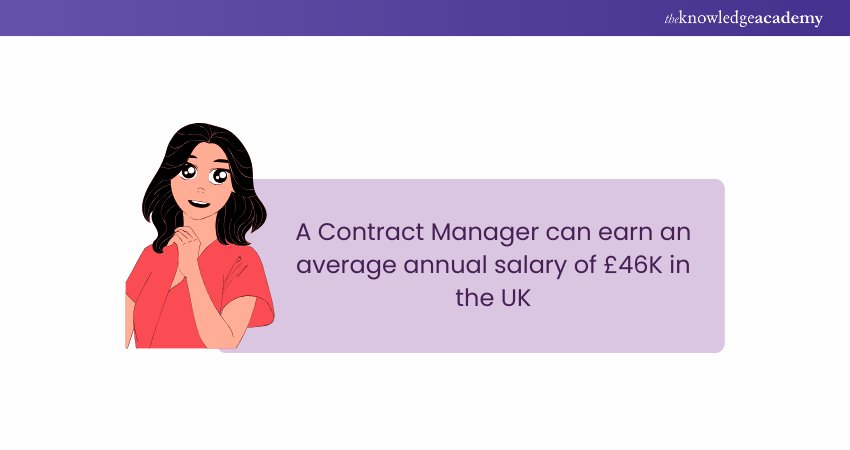
3) Signing: Upon negotiating the terms of the preliminary contract draft, both parties proceed to sign and stamp it. Approval of the contract means there's an agreement on the date the contract goes into effect.
4) Execution and Obligation Management: Once the contract is approved, it goes into effect on the agreed date. In this stage, the Contract Manager's responsibilities fully begin, ensuring that each party adheres to the terms of the contract and fulfils their obligations.
5) Renewal: Since most contracts have an end date, both parties can renew or terminate the contract when that date arrives, depending on the performance. Renewal may mean another round of negotiations to address issues identified during the previous agreement.
Benefits of Contract Management
Effective Contract Management can provide a variety of benefits, including:
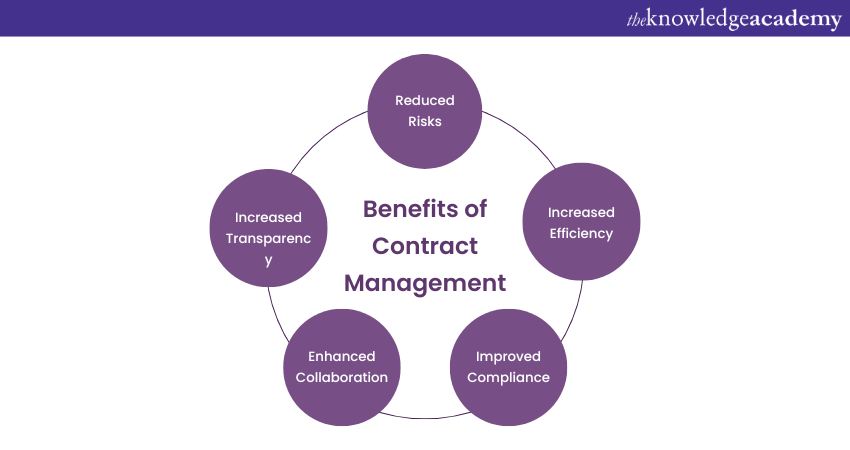
a) Reduced Risks: By actively managing contracts, organisations can reduce the risks associated with legal disputes, financial penalties, and other issues that may arise due to a breach of contract. Contract Management can help ensure that all parties meet their obligations and that any potential issues are promptly addressed.
b) Increased Efficiency: Proper Contract Management can streamline the contract lifecycle and help manage all the stages, such as drafting, negotiation, execution, and renewal. This can help enterprises save time and resources by avoiding redundancies, delays, and administrative errors.
c) Improved Compliance: Contract Management can help ensure that contracts align with regulatory and legal requirements. Contract Management can help assure that contracts comply with legal and regulatory requirements. This can diminish the risk of non-compliance penalties and legal disputes, and it can help businesses maintain a positive reputation.
d) Enhanced Collaboration: Contract Management can foster better communication and collaboration between the parties included in the contract. This can help them ensure that all parties involved understand their responsibilities and roles and can work together to achieve the desired outcomes.
e) Increased Transparency: By providing visibility into the contract lifecycle, effective Contract Management can help build trust between parties and lower the risk of misunderstandings or disputes.
Looking to hone your skills for efficient Contractor collaboration and supervision? Sign up for our Managing Contractors Training now!
What is Contract Management Software?
Contract Management Software is a sophisticated digital solution revolutionising the traditionally complex and time-consuming contract handling process. It offers a centralised platform where businesses can seamlessly create, store, and manage contracts throughout their entire lifecycle—from initial drafting and collaborative editing to negotiation, execution, and renewal.
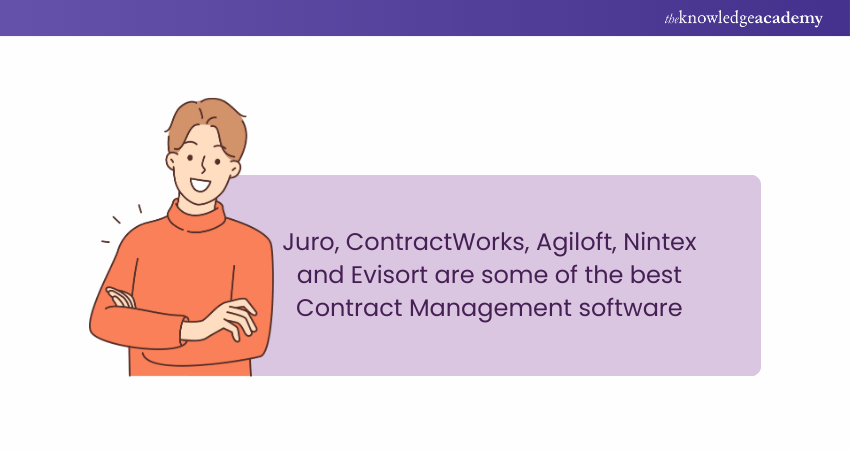
Beyond simplifying administrative tasks, Contract Management Software features advanced tools such as electronic signatures and version control, enhancing contract security and validity while minimising errors. Automated alerts for critical dates and milestones ensure organisations remain compliant with their contractual obligations.
Join the Commercial Contracts Management Training and enhance your knowledge and skills in managing complex commercial contracts effectively.
Contract Management Vs Contract Lifecycle Management
Contract Management involves the supervision and administration of contracts during their active phase. It primarily focuses on post-award activities, ensuring compliance, addressing changes, and resolving issues as they arise during the execution of contracts.
Contract Lifecycle Management (CLM), on the other hand, provides a more comprehensive approach that covers the entire lifespan of a contract. It includes pre-award phases such as drafting, negotiation, and post-termination analysis, offering a strategic view of the whole contract lifecycle.
The table outlines the distinctions between Contract Management and Contract Lifecycle Management (CLM). It highlights how Contract Management focuses on active contract oversight while CLM encompasses the entire lifecycle with strategic tools and comprehensive activities.
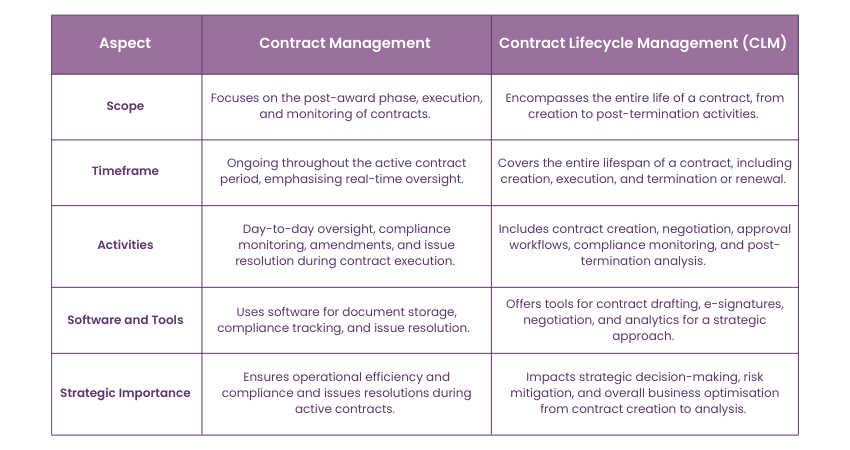
Elevate your career with our Contract Management Training. Gain essential skills and expertise to excel in this vital business function!
What are Contract Management Best Practices?
Now, let’s learn about the eight best practices in Contract Management. We have explained it below.
a) Centralised Contract Repository: Ensure visibility and accessibility across the organisation's portfolio, facilitating strategic management and timely action on agreements.
b) Inclusive Contract Management: Involve all departments, not just legal teams, to share responsibility, streamline processes, and manage contracts proactively throughout their lifecycle.
c) Auditable Contract Actions: Establish a clear audit trail to maintain accountability, compliance, and operational continuity, mitigating risks and ensuring regulatory adherence.
d) Automated Renewals: Automate contract renewal processes for timely reviews and decisions, preventing lapses and enhancing accountability among stakeholders.
e) Integration with Existing Tech Stack: Integrate Contract Management solutions with existing systems to support seamless workflows and enhance overall operational efficiency.
f) Data Security Compliance: Prioritise data security to safeguard sensitive information, ensure regulatory compliance, and foster trust among stakeholders.
g) Choosing CLM Software: Select the right Contract Lifecycle Management software by considering scalability, automation capabilities, integration options, and industry-specific expertise.
h) Immediate Action for Improvement: Enhance Contract Management practices promptly to avoid missed opportunities and increased operational costs, addressing legacy contracts and implementing robust solutions for maximum efficiency.
Businesses demonstrating these indicators exhibit effective Contract Management practices, leading to better contract outcomes and overall business success.
What are the Essential Skills Required for a Contract Manager?
Some of the skills that Contract Managers need include:
1) Strong negotiation skills.
2) Organisational skills and Time Management.
3) Risk Management.
4) In-depth knowledge of contracts and compliance with legal and regulatory requirements.
5) Ability to work on multiple projects and contracts at the same time.
What Responsibilities Does a Contract Manager Have?
Typical responsibilities of a Contract Manager include:
1) Researching contract terms.
2) Preparing, negotiating, and recording business contracts.
3) Alerting parties to renewals or extensions.
4) Overseeing the entire contract lifecycle.
5) Ensuring compliance with legal and company standards.
6) Identifying and mitigating risks.
Is being a Contract Manager a High-pressure Job?
Yes, being a Contract Manager can be a high-pressure job. This role involves managing multiple contracts simultaneously, handling extensive documentation, and maintaining clear communication with numerous stakeholders.
Signs of Successful Contract Management
Here are some signs of successful Contract Management:
1) Streamlined processes.
2) Improved compliance.
3) Clear oversight of contract performance and obligations.
4) Faster payments.
5) Strong relationships.
6) Proactive issue management.
7) Regular monitoring and review.
Conclusion
In conclusion, Contract Management is more than just about organising agreements—it's the backbone of efficient and compliant business operations. By understanding What is Contract Management and mastering this process, organisations can reduce risks, improve performance, and build stronger partnerships. Whether you are managing simple contracts or complex portfolios, applying effective Contract Management practices is the key to long-term success.
Boost your skills with our Specification and Service Level Training. Sign up now to excel in performance and service delivery!
Frequently Asked Questions

Contract management is the process of planning, administering, and managing commercial contracts with various entities, such as customers, partners, vendors, and employees.

A Bachelor’s Degree, often in business administration, law, finance, or a related field, is a necessary qualification for a contract Manager. An MBA or a master’s in a related field can also be advantageous.

The Knowledge Academy takes global learning to new heights, offering over 30,000 online courses across 490+ locations in 220 countries. This expansive reach ensures accessibility and convenience for learners worldwide.
Alongside our diverse Online Course Catalogue, encompassing 19 major categories, we go the extra mile by providing a plethora of free educational Online Resources like News updates, Blogs, videos, webinars, and Interview Questions. Tailoring learning experiences further, professionals can maximise value with customisable Course Bundles of TKA.

The Knowledge Academy’s Knowledge Pass, a prepaid voucher, adds another layer of flexibility, allowing course bookings over a 12-month period. Join us on a journey where education knows no bounds.

The Knowledge Academy offers various Contract Management Courses, including Contract Management Certification Training, Business Contract Law etc. These courses cater to different skill levels, providing comprehensive insights into Contract Management Strategies.
Our ISO & Compliance Blogs covers a range of topics related to Contract Management, offering valuable resources, best practices, and industry insights. Whether you are a beginner or looking to advance your Contract Management expertise, The Knowledge Academy's diverse courses and informative blogs have you covered.
Upcoming ISO & Compliance Resources Batches & Dates
Date
 Contract Management Certification Training
Contract Management Certification Training
Thu 16th Jan 2025
Thu 6th Mar 2025
Thu 22nd May 2025
Thu 24th Jul 2025
Thu 25th Sep 2025
Thu 20th Nov 2025
Thu 18th Dec 2025







 Top Rated Course
Top Rated Course



 If you wish to make any changes to your course, please
If you wish to make any changes to your course, please


